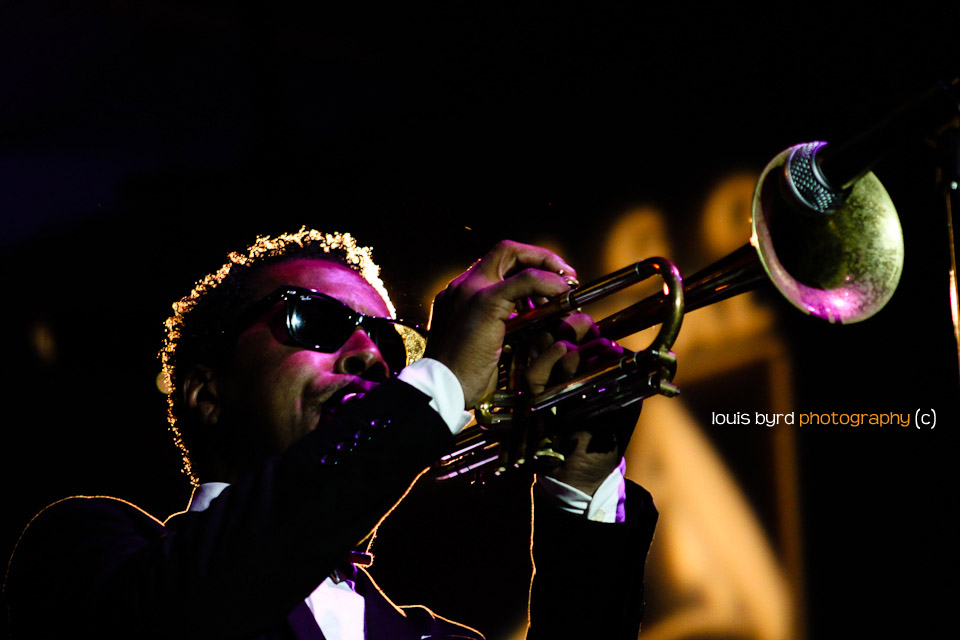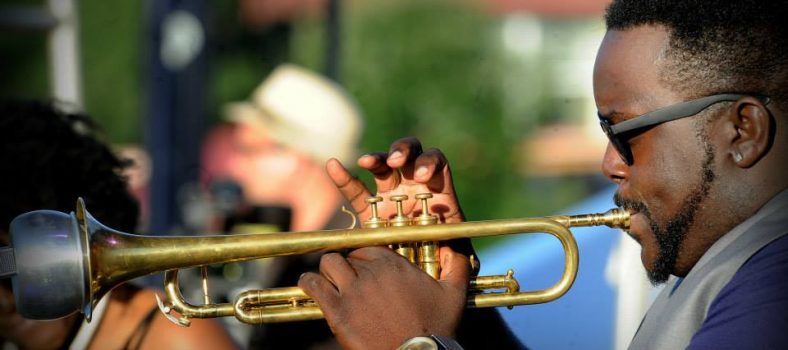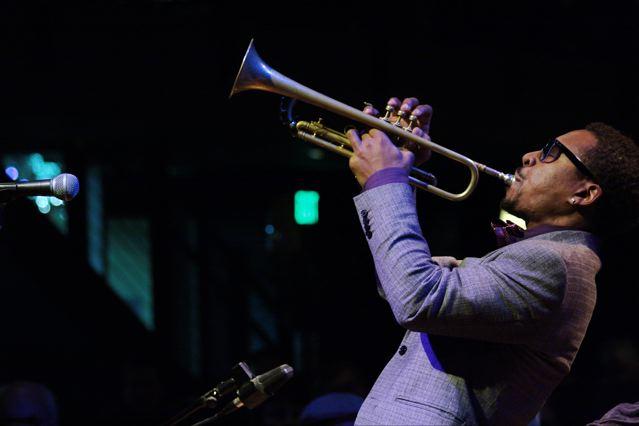 Photo of Roy Hargrove by John Whiting
Photo of Roy Hargrove by John Whiting
Jazz legend Sonny Rollins once said, “Improvisation is the ability to create something very spiritual, something of one’s own,” and Roy Hargrove has taken those words to heart. In an exclusive interview with iRockJazz, multiple Grammy winner, bandleader and jazz trumpeter extraordinaire, Roy Hargrove explains the spiritual connection he has with jazz that began very early in life. The humble role model discusses his new projects, playing from the heart, his proudest moments, and how the spirit of jazz has shaped who Roy Hargrove is today.
iRJ: One of our mutual friends is Russell Gunn and Russell said to me that when you all were growing up that at 16, 15 or 16 he said you were destined to be who you are today because it was there. Did you feel differently? Did you know anything different at that age or that the trajectory of your life would take you where you are today?
RH: When you’re that young, you ain’t thinking about stuff like that. You’re thinking about girls (laughs). You’re thinking about how you’re gonna eat lunch tomorrow. Actually, when I was that age, all I could think about was playing music. Just like now. It was just about every day I was figuring out how I could play better. I would come to band practice and come early and leave late. They would have to kick me out of the band room most of the time.
And when I got into high school, I was going to an arts school, this is when I started learning about artists like Clifford Brown and Freddie Hubbard. I was always somewhere with some headphones on or listening to something. I had a friend of mine, his father was a DJ, and we used to go to his house and listen to records all day. During that time, I wasn’t thinking so much about how I was going to do my career so much as I was thinking about how I could play better every day. I had a couple of my friends, we were in the jazz band together at that time, and it was kinda like trying to learn how to read because they had this college group at North Texas State [University] where they had this system called the one o’clock, two o’clock and all of that. And how you got to be in the top bands was that you had to learn how to read, so it was like we were playing a lot of very professional grade charts in the band. I was really trying to learn how to read better. It was like trying to learn how to play chord changes and stuff like that. So you know 15, 16 years old, you don’t know if you’re gonna be famous or not; you just want to do it.
There is a great piano player named Larry Willis who I learned from. I think I met him when I was about 17 or something like that. And he told me if you take care of the music, the music will take care of you, and I always believed that. So I figure if you just keep doing what you’re doing and try to do it as best as you can, then everything else will fall into place the way you want it to. And that’s kind of been true. I can’t say that it hasn’t.
iRJ: You’re considered to be a role model, whether you have chosen it or not, people have chosen you. How do you feel being a role model to musicians?
RH: I don’t know. I think something like that, time just does that. You can’t really help it. I didn’t choose that; it’s just something that happens over time. It’s like when I started, I was really young. And I remember that during that time you’re just like a rumor, and then people start to hear about you, and time goes on, and you keep playing and recording and traveling and touring, then people get to know how you are. The older you get, you have the young musicians that are coming along, and they see you and look at up to you, and you become some sort role model. I don’t know; it’s just something that happens kinda naturally. I don’t choose to think about it in any other way. Any way other than that’s just what time tends to do. I step into it, though. When young musicians come and ask me, how I do this or how do I do that, I tell them the truth.
There was a young trumpet player who came and asked me how he could learn how to play lines, and I just told him, “You have to learn how to play the piano. You have to learn harmony. You have to sit there and learn those chords, and after you figure out the harmony, you’ll be able to see it yourself, and you’ll be able to teach yourself how to do it. Then you won’t have to ask me.”
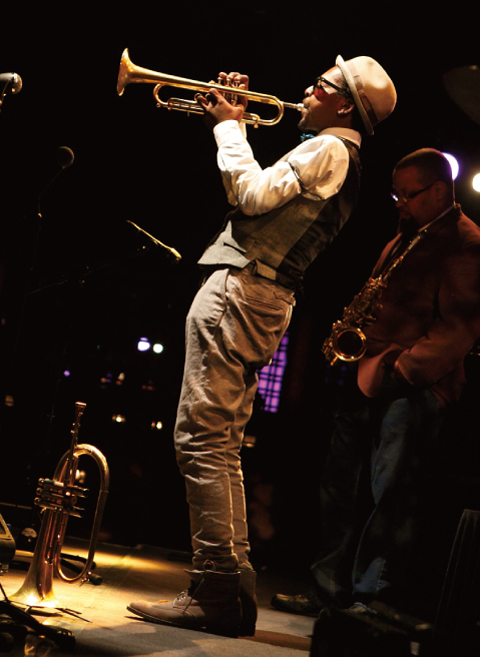 iRJ: It’s been rumored that you’re doing some more recording now. Is RH Factor coming back?
iRJ: It’s been rumored that you’re doing some more recording now. Is RH Factor coming back?
RH: Yeah, yeah, I’mma do something. I couldn’t tell you what it is, but I’m going to do something (laughs). I got some material I’ve been working on. I’ve been writing a lot lately.
iRJ: For your newest record, are you going to put it out as an indie artist, or are you going to sign to a label? What’s your strategy?
RH: I don’t even know right now. I try not to think about those things so much. I’m gonna record it, and I’ll let people in the business area handle the rest of that. I’m just gonna get it together and record it. My job is to write the music and make sure my musicians know it all and are cool playing it. That’s my job. I try not to involve myself too much in the red tape and the record label this and that, cause that stuff can really really get in the way of your creative flow and what you’re trying to do. You know what I’m saying? You know what I mean? Really? (laughs). It gets in the way, then you start worrying about how you gonna put it out and what label it’s on and all of that. It makes my head hurt. My manager, that’s his job; he does that. I let him handle that part. People probably disagree with me on that, but you know hey, they don’t have to do it. I’m doing it, and I just believe that the creative aspect is really, really important, so I involve myself in that wholeheartedly.
iRJ: Maybe you can give us a hint to what’s going to be different than the last project, not necessarily musically, but then again, maybe so. What are your thoughts?
RH: You know, I’m getting older, and I think I’m kind of, I’m mellowing out more as I get older. I’m feeling like music, to me is, I think that when you slow it down and make it more spread out, I think people can really understand because I think that most times when people buy recordings and when they actually purchase stuff that they want to have at home, it’s a lot better when it’s not screaming at you so much. That’s why people like Miles Davis are so important in the whole recording aspect of music because the music is so spaced out and mellow, you know, soft, as opposed to loud and fast. You know what I’m saying (laughs) I can’t explain, I can’t explain it as much as I can demonstrate it. It’s kind of like I feel the older I get the more I’m kind of mellowing out.
iRJ: You’ve been a bandleader for a while, and you have been able to hold your group together and continue to keep them working. What has been your secret to your success as a bandleader?
RH: (laughs) I don’t know if there’s a big secret. The guys that I play with, they know that I really love music a lot, and everything I do I’m very passionate about it. And you know, I try to keep a very strong melodic sense in everything I’m writing, and we like to have a good time when we play. That’s probably about it. No real secret about it. I mean if there is some secret, people just know that I’m really passionate about what I’m doing that’s all. I really mean it. I, I’m not doing it for play; I’m doing it for real. I think that music is a very spiritual thing, something that’s coming from the Creator, you know. You have to keep those communication lines clear and open and real.
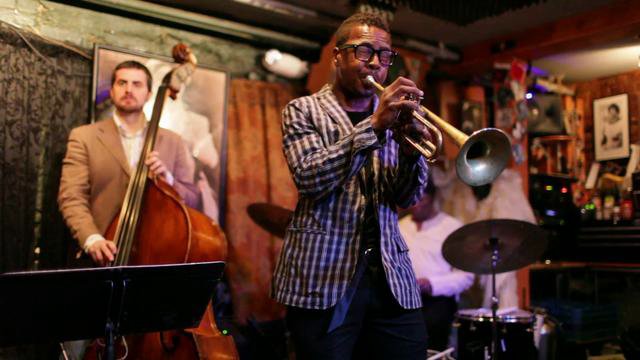 iRJ: Some of our most popular interviews with you have always been the ones that talked about playing from the heart, that you can’t do it for money.
iRJ: Some of our most popular interviews with you have always been the ones that talked about playing from the heart, that you can’t do it for money.
RH: Really?
iRJ: Yes, those videos have literally gone viral. Why do you think saying you play from the heart, those words coming from you, and those videos have become so popular with our viewers?
RH: I don’t know. It’s just, I just tell it how I see it and how I feel it. I believe that music is one of the most important art forms that we have. If you’re playing music, it should be something that comes from the heart, comes from the soul. It should be honest, I just believe in that. It’s a very spiritual thing. So I guess that people respond to that.
iRJ: When you played Dakota [Jazz Club], Prince ended up showing up. What was it like meeting Prince and playing with him? I know you played at his house. What was that collaboration like?
RH: He was real hospitable man. He was real cool. My friend sings backup with him, her name is Shelby Johnson, and I know her from the days with D’Angelo. She invited us to the show that they had out in LA, and afterwards, he brought us all back to his house; me, Esperanza [Spaulding] and Joe Lovano and some others, and we jammed there. He’s real cool man, real down to earth guy. We jammed there for a little while, and then he fed us some food (laughs) and then we left.
iRJ: I know that you’re doing something with Quincy Jones about the Clark Terry story. That’s a very interesting story. What does Clark Terry mean to Roy Hargrove?
RH: Clark Terry has always been like the best to me. He is always very encouraging towards young musicians and such a wonderful warm spirit. I’m always inspired by the joyfulness in the sound of his playing. He’s just an allover great guy (laughs). He reminds me of somebody in my family.
iRJ: Since you’ve played with the best musicians in all genres from R&B, to Hip hop, jazz and everybody in-between, what haven’t you done, and what you would like to do?
RH: Well, guess I would still like to try to do something along the mainstream. I’d like to try to get some music out there that everybody can hear. And I guess really one thing I really like to do is to try to get somehow involved in education because I think that the young people, it’s hard for them right now because of all the programs in the arts that are being shut down everywhere. So I would like to try to involve myself somehow in trying to keep this thing alive in the educational system because if we don’t have art for the young people, it’s going to be hard for them just to be able to live life, you know? It’s important to have some kind of creativity in life. I believe that. That’s one thing I’d like to do.
I was telling a young friend of mine, a minister friend of mine, that there are three things I want to do. I want to have some kind of a school. I’d like to have maybe a nightclub of some sort, and also a studio. If I had those three things, I‘d be straight. (laughs)
iRJ: Where would you have your nightclub and school? What city?
RH: It doesn’t even really matter. I mean, I’m living in NY so I guess here; that would be great.
iRJ: What has been your hindrance in doing so?
RH: Well it’s kind of hard to do that stuff when you don’t have enough money. (laughs) You need lots of money to do these things. That’s probably the only thing that’s holding me back is that I don’t have the financial wherewithal to make it all happen right now. I’m working on it though (laughs).
It would be nice to meet somebody, a rich person to help me out, maybe sponsor me a little bit. That might help, though. (laughs) That might help. It’s difficult, especially if you want to have a club or something like that. It’s real hard to keep something like that going now because people don’t really go out that much anymore. Most of the time, people stay indoors nowadays and they don’t go out to hear that much live music, but I believe, I do believe that if the music is right, then people will always come out.
Every time my quintet plays anywhere, we always sell out the place. Anywhere we go. We played the Village Vanguard for like two weeks, and the place was sold out every night. We played the Blue Note not too long ago, and the place was full every night. So if the music is right, people will come out. I believe that. It’s difficult now because there is so much fluff. People, sometimes they don’t want to come out, if it’s not worth it.
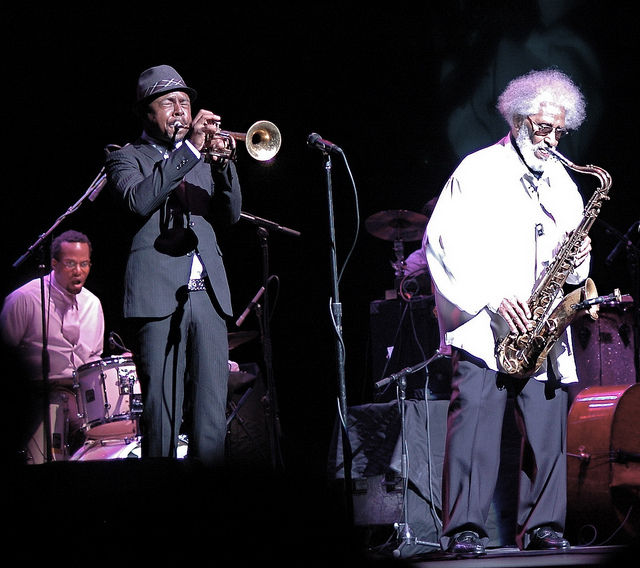
iRJ: To date, what’s your biggest honor or your proudest moment?
RH: I have to say meeting and playing with Sonny Rollins, and having him know me by my first name. (laughs). Knowing that this great, great musician calls me like I’m a friend of his is something that I can say makes me feel great. Sonny Rollins, you know what I mean? Sonny Rollins! (laughs). He’s not the only one, but he is definitely the one who makes me feel like ok, that’s an honor to know him like that.
iRJ: In the world today, we have a Black president, but there are a lot of racial issues that are still around with, for example, the Trayvon Martins of the world. As an African American musician who travels all around the world in different cities, do you still feel safe in the world, or do you feel the sense of the world’s change or acceptance or lack thereof?
RH: I ain’t gonna lie to you, a lot of times I feel like sometime I don’t want to go outside. (laughs) Cause it’s crazy. It’s crazy out there now. People are doing lots of crazy stuff, and you know I think that my mother and my grandmother always instilled in me a very strong belief in God, and I believe that if you have yourself right spiritually, you don’t really have to worry about anything else. You’ll be protected in that way, but at the same time though, the world is a pretty crazy place. You know when I’m traveling around, going overseas and places like that, I get some pretty strange experiences every now and then, but you just stay grounded and it’s all in perspective.
iRJ: With age and with time and experience things have changed, even from the early times since we met. What’s really different today with Roy? What’s the heightened awareness musically and socially? Basically, who is Roy Hargrove in 2014?
RH: Well, I can say this it’s hard for me to get used to going to the club and being like the older guy. (laughs). That one is really like hard for me to get used to young people coming up to me and calling me Mr. Hargrove and stuff. That’s different, but I’d have to say that I’m trying to make my music have a very vocal quality and to sing with every aspect of every note that I’m playing, making sure every note is an important note, something that has a therapeutic quality to it. I think that music should be something that when people hear it, it takes away the pain and the anger and all the negative energies that are in this world, so I think that I’m sort of coming into a minister type thing with what I’m doing with my music as I get older. I start thinking a lot about my grandmother and my mom and people in my family who instilled these very important qualities into my brain and the way I’m thinking.
The thing is, I used to go out a lot to jam sessions and stuff like that. I don’t do that so much anymore. I spend a lot of time at home now just trying to gather myself to do it. When you don’t go out a lot, I notice that when you finally do go out, people have missed you. The last time I went out to the club, everybody was like really happy to see me there. So I guess I could say that I’m just getting more relaxed as I get older now. But I really do believe that music should have a spiritual quality. Every time you play, it should be something that means a lot. It’s meaningful so that everybody who’s listening gets to take something away from that, so when they go home, they will remember that sort of organic quality because it’s difficult to keep things, that connection towards something real because it’s hard to keep that nowadays.
Everybody’s got computers, the gadgets, “the this and the that.” It’s hard to keep that connection to something that’s real, so I have to say that that’s what I’m striving for right now is to try to keep that connection alive. Because I think that is something that is very real and very human. We can’t all be robots around here you know? And it seems like society is pushing towards that. Everybody should become automatic and robots when doing things. Makes you wonder if people will even be using pen and paper anymore (laughs). I saw this one movie where this guy went to a restaurant, and the lady who was waiting on him, she couldn’t do anything. All that was in front of her were pictures on buttons. She couldn’t read or anything. It seems that that was like a picture of the future. I don’t know. I’m going off on a tangent, but you know I think it’s important for us to keep the connection towards organic life and substance that’s all, and that’s really what I’m striving for to be a representative of things like that, and I’ll probably be one of the only ones, but I’ll stand strong on that for sure. I might be in the minority, but I will stand strong on that. I won’t be deterred from that because it’s something that keeps the sustenance of life.
Roy Hargrove will be appearing at the Atlanta Jazz Festival appearing on the Main Stage on Friday, May 23rd at 9pm.
by Geveryl Robinson


